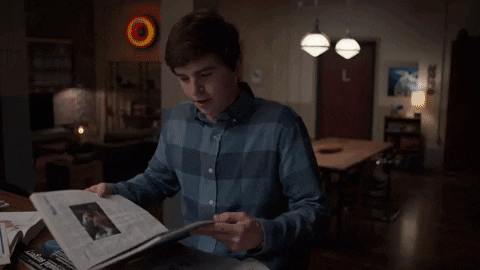(2/2) Mind’s Eye: Games
Do you know how powerful your mind’s eye is? Well if you like to daydream and you’re in a playful mood, then I’ve got 13 games that’ll test the limits of your visualization skills.
Howdy playful people!
In my last post we chatted about what the mind’s eye is and how it might differ from person to person. And we explored 6 mental imagery superpowers that we all possess to different degrees.
There was conjuring: the ability to generate accurate mental images.
Transmutation: the ability to manipulate traits.
Orientation: the ability to manipulate space.
Astral projection: the ability to detach our mind from our body.
Playback: the ability to reproduce and manipulate mental recordings.
And double vision: the ability to use our mind’s eye and our body’s eyes at the same time.
Games
These 6 abilities enable us to bend our reality. And because each of our brains have their own unique wiring, we can each use these powers to varying degrees. Some of us, in extraordinary and uncommon ways.
So let’s put our mind’s eye to the test!
I’ve always considered myself to be a dedicated daydreamer. My imagination has always been my favourite playground. So I thought it would be fun to compile a list of my 13 favourite mind’s eye games that I’ve played with over the years.
Let’s get started!
Game 1: DALL·E | Conjuring
Daydreaming tends to be a solitary activity, but for this first game I’ve got a friend for us to play with. Meet DALL·E, an artificial intelligence that can create realistic images and art from any description given to it.
The goal of this game is to test our conjuring abilities.
On DALL·E’s Instagram account, you’ll find a bunch of fun and challenging prompts to inspire your imagination.
Ever wondered what the portrait of a blue alien singing opera, might look like? Because this is what DALL·E was able to visualize.
How about a 3D rendering of a bouldering wall made of Swiss cheese?
Or a pig in sunglasses wearing an Aloha shirt blowing in the wind while driving a motorcycle through the desert?
With over 300 posts and prompts to date, you’ll be sure to find some fun ideas to try to conjure up in your imagination.
Game 2: Augmented Reality Tooning | Transmutation + Double Vision
I once had a theory that I could get better at recalling details of scenes if I drew them up as cartoons in my head. The way I figured it, the act of cartoonizing something forces us to pay attention to the important details.
The goal of this game is to practice our transmutation and double vision abilities. And it’s pretty simple. Just look around you and try to imagine things and people as cartoon versions of themselves.
Game 3: Invisibility Cloak | Transmutation + Double Vision
This game, for me, is a level harder than the last one.
Its goal is also to train our transmutation and double vision skills. But unlike the last one, where we were editing things in our environment, this time we’re editing things out of our environment. So this time, look around and try turning things invisible.
Game 4: Dissection | Conjuring + Orientation
Like every engineering savant on tv, this game is going to have you targeting your conjuring and orientation powers. All you’ve gotta do is visualize breaking objects down into their individual components.
Game 5: Honey, I Shrunk Myself | Astral Projection
Astral projection is probably my favourite power to play with. In this game our job is to pick a spot in our environment, imagine that we’ve shrunk down into the size of an ant, and enjoy the view.
Game 6: Mirror, Mirror | Astral Projection
You know that game in acting classes, where you pair up with a partner and mirror each others movements? In this game you’re your own partner.
Imagine yourself looking at your reflection in a mirror, now teleport your perspective to your reflection and look at yourself through your reflection’s eyes.
Game 7: Distant Directions | Astral Projection
This game might be particularly challenging for those of us who are a little bit more directionally challenged than the rest.
The goal: try to figure out what you would be looking at in another location if you were facing the same direction. So if for example you’re looking perfectly north-east right now, imagine what would you be looking at if you were pointed exactly north-east in your parent’s place.
Game 8: Art inner-teleportation | Astral Projection
Totally inspired by Blue’s Clues, this is one of my favourite meditative games for playing with astral projection.
The goal is simple. Find a scenic picture you like and imagine teleporting into it.
Game 9: Memory Palace | Astral Projection + Conjuring
In my last post, I mentioned the method of loci strategy that memory athletes use to store information. The memory palace is another name for it and I had to include it, because it’s such a powerful tool. And the foundation of it is simple, imagine walking around a place you’re familiar with and take note of the items and features of that environment.
Game 10: Spy Cam | Astral Projection + Playback
Be careful with this one if you haven’t had a productive day, because it might serve as a bit of a rude awakening. Imagine you’ve got a surveillance cam that’s been watching over you for the past day. Now imagine clicking rewind to when you got out of bed this morning and now click play. Increase its playback speed to 2x and watch your day unfold from a bird’s eye view in double the speed.
Game 11: Rerun | Playback
You remember that fantastic pivot scene from Friends? If yes, then great! You just played Rerun! All you’ve gotta do is watch reruns of scenes from your favourite shows and movies in your head.
Game 12: Order of Operations | Astral Projection + Playback
This one is probably the most practical of all the games I have. I use this exercise anytime I have a list of todos and want to figure out the most efficient order to carry them out. I essentially use astral projection to conjure up a clone of myself. Then I’d imagine him going through the tasks in different orders until I find one that I think works the best.
Game 13: TV/Movie inner-teleportation (World Building) | Conjuring + Astral Projection + Playback
Finally, my favourite game of them all! TV and movie inner teleportation.
For this daydreamy challenge you’re going to need to rely on all of the powers that we’ve been using. Pick your favourite show and movie and inject yourself into it as a new character. This game is daydreaming at its finest and essentially has you creating and visualizing your own scenes and storylines in your head.
There you have it! 13 games to test your mind’s eye powers. Which ones did you find easiest? And more importantly, did any of them manage to give you insight on which powers and power combinations you thrive at?
Practical Applications
Simulation Theory of Cognition
Everything we can imagine is real.
Have you ever heard of the simulation theory of cognition? It’s a neat concept you’ve surely experienced first-hand.
It proposes that when we imagine doing something, the sensory and motor areas in our brain activate in the same way as if we were actually doing that thing.
So these mind games might serve as more than a way to test and play with our powers. Perhaps they can also serve as a tool.
Tool for Comfort
A tool for comfort, for example.
Just imagine giving your parent a hug and the benefits should be immediate. Your brain is hugging your virtual parent, who is in turn virtually hugging you back.
Tool for Dream Productivity
Perhaps, a tool for dream productivity.
Some people with aphantasia are able to have vivid dreams. So, there might be a distinction between the mind’s eye we use for intentional imagination versus subconscious imagination.
And since imagination can activate our motor cortex, maybe harnessing our mind’s eye powers in combination with lucid dreaming could allow us to practice and improve at activities while we’re sleeping.
Final Foods for Thought
Researching the mind’s eye for these last couple posts has sparked a bunch of interesting thoughts. So I’m going to finish off with a bit of a rapid fire of 10 of the top lingering thoughts that this topic inspired.
1 | Personalized Education Advocation
The more we learn about individual differences in how our brains work, I wonder how we can do more to take a personalized approach to education?
One where the emphasis is placed less on adapting our minds to the content and more on adapting the content to our individual minds.
“This semester you’re all going to read these 5 books. And, even though half of you aren’t going to resonate with them at all, you’re all going to leave this course with the knowledge that you can find its summary somewhere online.” → “This semester you’re all going to figure out your favourite literary genres and you'll work toward better understanding why they resonate with your individual tastes the most”.
2 | Reading Differences
I also wonder how our place on the mind’s eye spectrum influences the way we read.
Do people higher on the scale read at a slower pace because they spend more time conjuring visualizations of the scenes?
Do those mental visualizations increase enjoyment?
How does having a mind’s eye affect the genres that we gravitate to?
I, for example, sometimes have a hard time reading scifi, because I struggle to picture the futuristic settings. I do however enjoy reading horror stories. Perhaps because oftentimes a descriptive setting is integral to the ambiance and plot itself.
3 | Nature vs Nurture
In this post, I played with the idea that the mind’s eye can be a skill we can improve. It's got me questioning whether there’s a nature vs nurture angle to be explored.
Perhaps, it’s like language, where for a lot of people, it would be most easily learned in childhood?
Does playing with mental imagery as a child increase how much we use it as an adult?
Perhaps, kids who read more were forced to develop their own mental images? Or, perhaps kids who watched a lot of tv, spent time revisiting episodes in their mind and thus exercising their mind’s eye?
4 | Inducing Visualisations
For those who don’t experience much mental imagery, what are the ways it can be simulated or stimulated for them. There are reports of aphants being able to experience a mind’s eye using psilocybin therapy, for example.
5 | Ethics from an Aphant’s Perspective
If I were to put myself in the mind of an aphant, I’d question the ethics of imagery.
If there are people who can relive and re-view images in their mind, is it ethical to show people disturbing images. Wouldn’t we be embedding a new memory into their minds which might continue to haunt them afterward?
This argument could become particularly relevant for showing graphic evidence to juries or presenting graphic documentaries to unsuspecting watchers.
6 | Mind’s Eye through Time
I wonder how our mind’s eye has changed through time. Especially now that we have so much vivid media. Has the creativity of our imaginations been augmented with visual media?
7 | Escapism
For those with an active mind’s eye, I wonder if they adapt to boredom more easily.
I see people quiver at the thought of being locked away in an empty room on their own for hours or days, and I think I’d probably just see it as a good excuse to replay movies or episodes of shows in my head.
8 | Aphantasia as a Super Power
I wonder about the advantages that might come with aphantasia.
I’d imagine, for example, that aphants would be less susceptible to false memories. There’ve been many times in my life, for example, where I wasn’t sure if I was remembering a scene from my own life or from the life of a character I saw on tv.
I could also imagine that people with vivid mind’s eyes could be more susceptible to something like post traumatic stress disorder, since they’d have the ability to relive the visuals of their memories.
9 | Language Interpretation
I wonder if aphants might be quicker to default to interpreting something as a metaphor.
I’ve read aphants detail the first time they heard people suggest they count sheep to help them fall asleep. They assumed it was some sort of metaphor.
The fact that communication doesn’t guarantee shared understanding, makes me wonder what I interpret as figurative, which is actually meant literally, or vice versa.
For example, when the villain in a show says to their opponent, “I can smell the fear on you”, is that real? Are there synesthetes who interpret emotions through their sense of smell?
10 | Other Mind Senses
While exploring this topic, I was introduced to concepts of tactile imagery, the mind’s ear, and other ways people experience sensation within their minds.
How much more interesting can this conversation get if we consider our minds’ version of the other senses that exist (like temperature, comfort, movement, taste, etc).
So what do you think? Does this conversation about the mind’s eye spark any interesting thoughts for you? What was your favourite takeaway from all of this?
For me, I’d say my favourite takeaway is how all of our inner worlds are so unique and varied. And that even if the mind’s eye isn’t your forte, there are so many other powers and perspectives and abilities that only your mind is uniquely capable of taking advantage of.
So keep your mind’s eye open and on the lookout for the things that make your mind special.
Because, your mind really is special.
Peace,
Lamar









